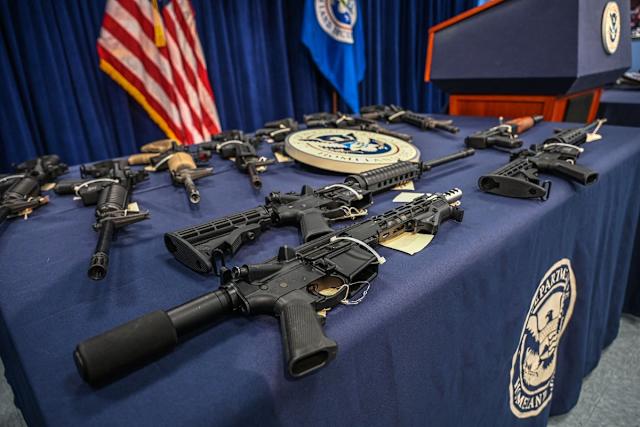LOS ANGELES (BN24)— A Chinese man living illegally in the United States has pleaded guilty to federal charges of exporting firearms, ammunition and military equipment to North Korea at the direction of Pyongyang officials, the US Department of Justice announced Monday.

Shenghua Wen, 42, of Ontario, California, admitted to one count of conspiracy to violate the International Emergency Economic Powers Act and one count of acting as an illegal agent of a foreign government. The 1977 federal law empowers the president to restrict commerce with countries deemed threats to national security.
According to prosecutors, Wen shipped at least three containers of guns bound for North Korea during 2023, with one shipment successfully arriving in Nampo, North Korea, via Hong Kong. The California resident orchestrated the illegal arms trafficking operation despite knowing such exports violated federal law and international sanctions.
To facilitate the weapons smuggling scheme, Wen purchased a firearms business in Houston, Texas, and used fraudulent paperwork to conceal the actual contents of his shipping containers, prosecutors said. The elaborate operation was designed to circumvent strict export controls governing military equipment shipments to the isolated communist nation.
Wen, who was arrested in December, also procured approximately 60,000 rounds of 9mm ammunition and obtained sensitive technology including a chemical threat identification device intended for shipment to North Korea. The extensive procurement operation involved multiple categories of restricted military and dual-use equipment.
The illegal arms trafficking operation began following Wen’s meetings with North Korean officials at the North Korean Embassy in China before he entered the United States on a student visa in 2012. These diplomatic contacts allegedly provided the initial instructions for the multi-year weapons procurement scheme.
North Korean government operatives allegedly transferred approximately $2 million to Wen to finance the illegal arms export operation. The substantial funding enabled the purchase of firearms, ammunition, and sensitive technology through legitimate American businesses that were unaware of the ultimate destination.
The US Attorney’s Office for the Central District of California emphasized that Wen acknowledged the illegal nature of his activities throughout the operation. “Wen admitted that at all relevant times he knew that it was illegal to ship firearms, ammunition, and sensitive technology to North Korea,” the office stated in a press release.
Prosecutors noted that Wen admitted to never obtaining the required federal licenses to export ammunition, firearms, and sensitive devices to North Korea. The defendant also acknowledged acting at the direction of North Korean government officials without providing mandatory notification to the Attorney General of the United States regarding his foreign agent activities.
During FBI questioning, Wen revealed his understanding of North Korea’s intentions for the smuggled weapons and ammunition. According to a criminal complaint filed in September, Wen told investigators he believed the North Korean government wanted the military equipment to prepare for an attack against South Korea.
The case highlights ongoing concerns about illegal arms trafficking to North Korea despite comprehensive international sanctions designed to prevent the regime from acquiring weapons and military technology. US authorities have intensified efforts to detect and prosecute individuals involved in sanctions evasion schemes.
Wen faces significant federal penalties when he appears for sentencing in August. The International Emergency Economic Powers Act violation carries a maximum penalty of 20 years in prison, while the illegal foreign agent charge could result in up to 10 years imprisonment.
The successful prosecution represents a major victory for federal authorities working to enforce arms export controls and prevent weapons technology from reaching hostile foreign governments. The case demonstrates the sophisticated methods used by foreign operatives to acquire American military equipment through legitimate business channels.
Federal investigators continue examining potential additional conspirators and related weapons trafficking networks that may have facilitated similar illegal exports to North Korea or other sanctioned nations. The investigation underscores the ongoing challenges facing US export control enforcement in an era of complex international supply chains.



